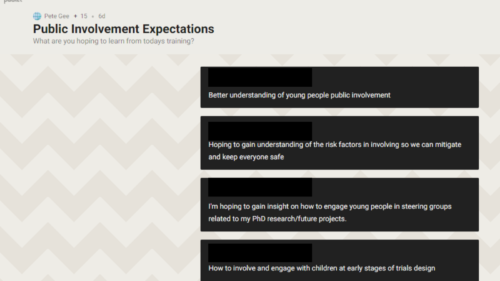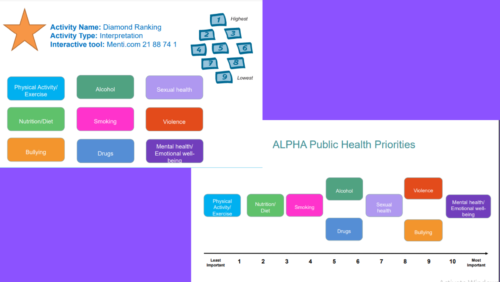
On 28th January 2021, Peter Gee, Jeremy Segrott, ALPHA members and Health and Care Research Wales ran the first online session of the short course ‘How to Involve Young People in the Design and Conduct of Research’. Here, Pete discusses the transition from running the course in person to online.

Now that many of us have made the adjustment to remote working and learning, it was inevitable that we would have to move our short course online too. Although the demand to run the session was still there*, we wanted to be sure the online workshop would have the same impact.
The strength of previous workshops, in our opinion, lay in the interactive element. How could we create this online? As ever, team ALPHA (the young people who advise our researchers) came up with some excellent ideas, reflecting on what works during our own online sessions.
We decided the course should be 2.5 hours long (face-to-face sessions usually ran for a day). We wanted to avoid the dreaded ‘Zoom fatigue’ and felt that this was a reasonable length (factoring in two breaks). It was split into three parts:
- The Health and Care Research Wales Public Involvement Standards and approaches to involving children and young people in research;
- Case study examples to illustrate the key approaches, what facilitates and what can hinder public involvement, and the possible impacts;
- A practical session, where delegates applied what they’d learned to develop a plan for involving children/young people in their own research projects or research ideas.

We started the session using a Padlet (an online interactive noticeboard) ‘Post it Storm’ (left) to gauge what attendees wanted to learn and keep the session relevant to their interests.
We still kept the breakout sessions – using the Zoom breakout rooms and we also used Mentimeter, an app for creating presentations with real-time feedback (below) to help keep the training as interactive as possible.
One of the selling points of this training was hearing first-hand from young people involved in ALPHA. Fortunately for us, Bethan, Elina and Issy were available to help design, run and facilitate the session – they did a great job.
Attendee feedback was positive:
‘It was really helpful to ‘use’ some of the tools you ‘use’ – when you return to face-to-face sessions it would be helpful to keep this aspect!‘
‘Really useful, especially having the Alpha members involved in the session.’
‘You have inspired me. It’s been a very rich 2.5 hours. Thank you!‘

In conclusion, Health and Care Research Wales, Jeremy and I were very happy with how the day went, plus no tidying up at the end, bonus! However, given the choice, you can’t beat a face-to-face meeting. Fingers crossed next year that will be possible.
Find out more about DECIPHer’s short courses here.
* When it actually came to booking onto the course, uptake was slow, causing me a few sleepless nights wondering whether to postpone! In the end we had a full house, with people booking on nearer to the time. In hindsight, this can probably be attributed to the difficulty of forward planning in a pandemic and the demands of working from home, homeschooling etc.